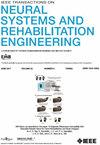Tremor Suppression Using Functional Electrical Stimulation
IF 4.8
2区 医学
Q2 ENGINEERING, BIOMEDICAL
IEEE Transactions on Neural Systems and Rehabilitation Engineering
Pub Date : 2024-09-02
DOI:10.1109/TNSRE.2024.3453222
引用次数: 0
Abstract
Parkinson’s disease (PD) and essential tremor are two major causes of pathological tremor among people over 60 years old. Due to the side effects and complications of traditional tremor management methods such as medication and deep brain surgery, non invasive tremor suppression methods have become more popular in recent years. Functional electrical stimulation (FES) is one of the methods used to reduce tremor in several studies. However, the effect of different FES parameters on tremor suppression and discomfort level, including amplitude, the number of pulses in each stimulation burst, frequency, and pulse width is yet to be studied for longer stimulation durations. Therefore, in this work, experiments were performed on 14 participants with PD to evaluate the effect of thirty seconds of out-of-phase electrical stimulation on wrist tremor at rest. Trials were conducted by varying the stimulation amplitude and the number of pulses while keeping the frequency and pulse width constant. Each test was repeated three times for each participant. The results showed an overall tremor suppression for 11 out of 14 participants and no average positive effects for three participants. It is concluded that despite the effectiveness of FES in tremor suppression, each set of FES parameters showed different suppression levels among participants due to the variability of tremor over time. Thus, for this method to be effective, an adaptive control system would be required to tune FES parameters in real time according to changes in tremor during extended stimulation periods.利用功能性电刺激抑制震颤
帕金森病(PD)和本质性震颤是造成 60 岁以上老人病理性震颤的两大主要原因。由于药物治疗和脑深部手术等传统震颤治疗方法的副作用和并发症,近年来非侵入性震颤抑制方法越来越受欢迎。在多项研究中,功能性电刺激(FES)是减少震颤的方法之一。然而,不同的功能性电刺激参数(包括振幅、每次刺激的脉冲数、频率和脉冲宽度)对震颤抑制和不适程度的影响,还有待对较长的刺激持续时间进行研究。因此,本研究对 14 名患有帕金森氏症的参与者进行了实验,以评估三十秒的离相电刺激对静止时手腕震颤的影响。在保持频率和脉冲宽度不变的情况下,通过改变刺激幅度和脉冲数来进行试验。每位受试者每次测试重复三次。结果显示,14 名参与者中有 11 人的震颤总体上得到了抑制,3 人没有平均的积极效果。结论是,尽管电刺激疗法能有效抑制震颤,但由于震颤随时间的变化而变化,每组电刺激参数在参与者中显示出不同的抑制水平。因此,要使这种方法有效,需要一个自适应控制系统,以便在长时间刺激过程中根据震颤的变化实时调整 FES 参数。
本文章由计算机程序翻译,如有差异,请以英文原文为准。
求助全文
约1分钟内获得全文
求助全文
来源期刊
CiteScore
8.60
自引率
8.20%
发文量
479
审稿时长
6-12 weeks
期刊介绍:
Rehabilitative and neural aspects of biomedical engineering, including functional electrical stimulation, acoustic dynamics, human performance measurement and analysis, nerve stimulation, electromyography, motor control and stimulation; and hardware and software applications for rehabilitation engineering and assistive devices.

 求助内容:
求助内容: 应助结果提醒方式:
应助结果提醒方式:


